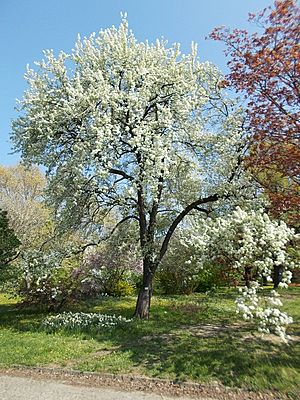Pyrus betulifolia facts for kids
Quick facts for kids Pyrus betulifolia |
|
|---|---|
 |
|
| Scientific classification |
|
| Kingdom: | Plantae |
| Clade: | Tracheophytes |
| Clade: | Angiosperms |
| Clade: | Eudicots |
| Clade: | Rosids |
| Order: | Rosales |
| Family: | Rosaceae |
| Genus: | Pyrus |
| Species: |
P. betulifolia
|
| Binomial name | |
| Pyrus betulifolia Bunge
|
|
| Script error: The function "autoWithCaption" does not exist. | |
| Synonyms | |
|
Aria betulifolia (Bunge) M. J. Roem. |
|
Script error: No such module "Check for conflicting parameters".
The Birchleaf pear (Pyrus betulifolia) is a type of wild pear tree. It is also known as Tang li in China. This tree gets its English name because its leaves look a lot like the leaves of a birch tree. It naturally grows in the leafy forests of northern and central China and also in Tibet.
Contents
Discovering the Birchleaf Pear
The Birchleaf pear is a tree that loses its leaves every year. This means its leaves fall off in the autumn. It can grow quite tall, reaching up to 10 meters (about 33 feet) high when it has good growing conditions.
What Does It Look Like?
This pear tree has special features to protect itself. It has strong, sharp thorns that are actually changed stems. These thorns help keep animals from eating its leaves. The leaves themselves are narrow and long. They look very similar to the leaves of a birch tree, which is why the tree's scientific name, betulifolia, means "birch leaf."
Where It Grows Naturally
The Birchleaf pear is native to certain parts of Asia. You can find it growing wild in the forests of northern and central China. It also grows in the high-altitude region of Tibet. These areas provide the right environment for the tree to thrive.
How People Use the Birchleaf Pear
The Birchleaf pear produces small fruits. These fruits are tiny, usually only about 5 to 11 millimeters (less than half an inch) across. Even though they are small, they are useful! In China, these fruits are used to make a type of rice wine. In Japan, they are used as an ingredient in sake, which is another kind of rice wine.
This tree is also very important for growing other types of pears. Farmers use the Birchleaf pear as a "rootstock." This means they use its strong roots and lower stem to graft (join) parts of other popular Asian pear varieties onto it. This helps the new pear trees grow well and be strong.
See also
 In Spanish: Peral hojas de abedul para niños
In Spanish: Peral hojas de abedul para niños
 | Anna J. Cooper |
 | Mary McLeod Bethune |
 | Lillie Mae Bradford |

